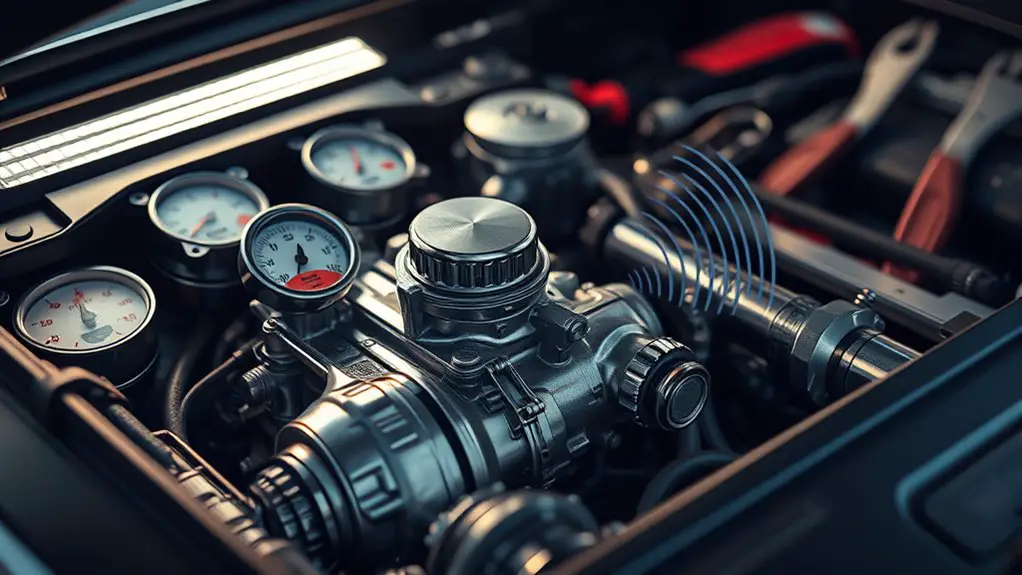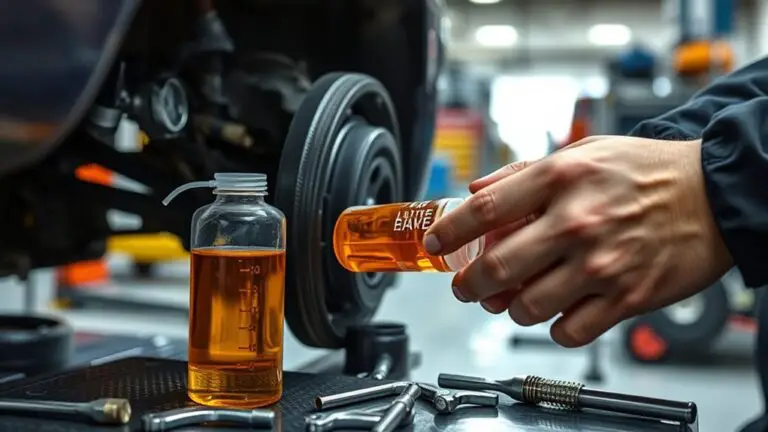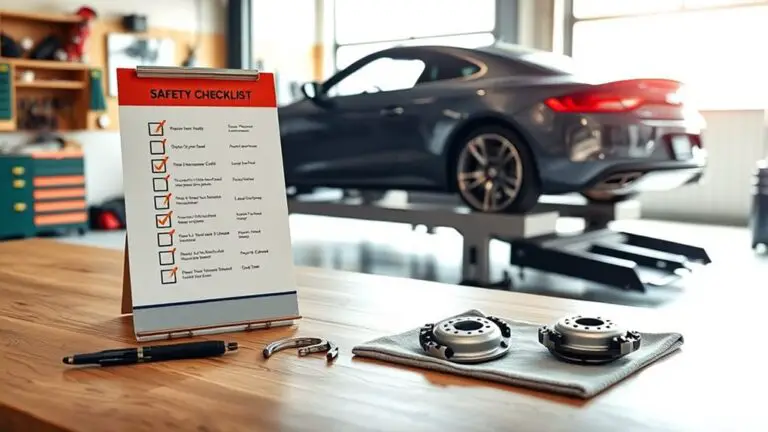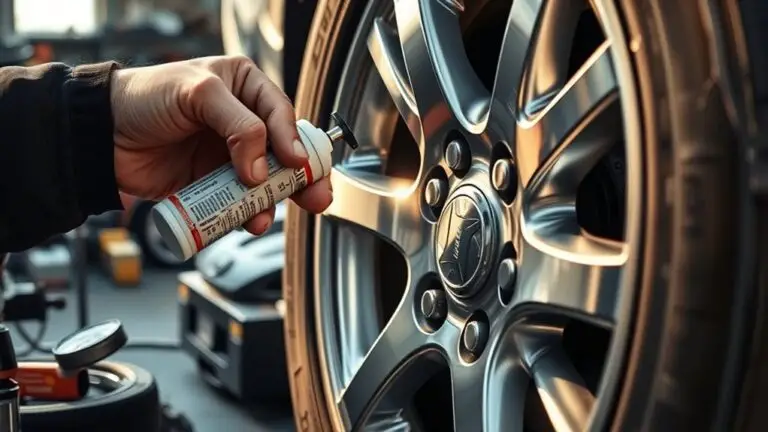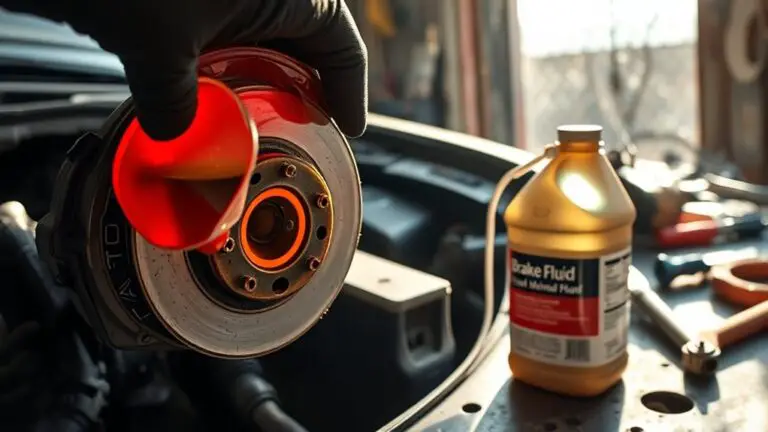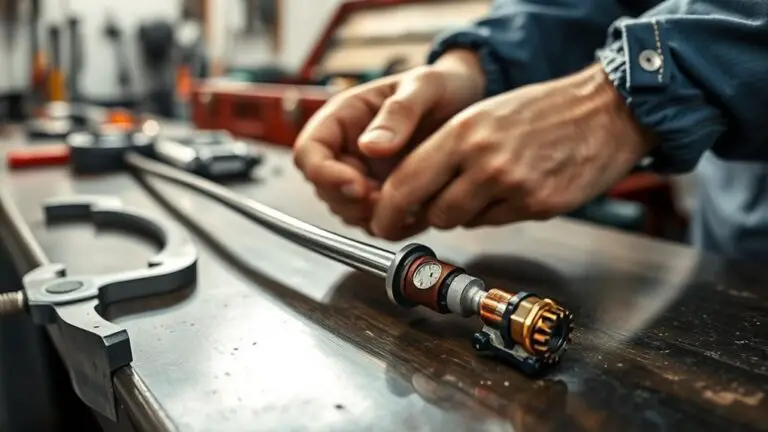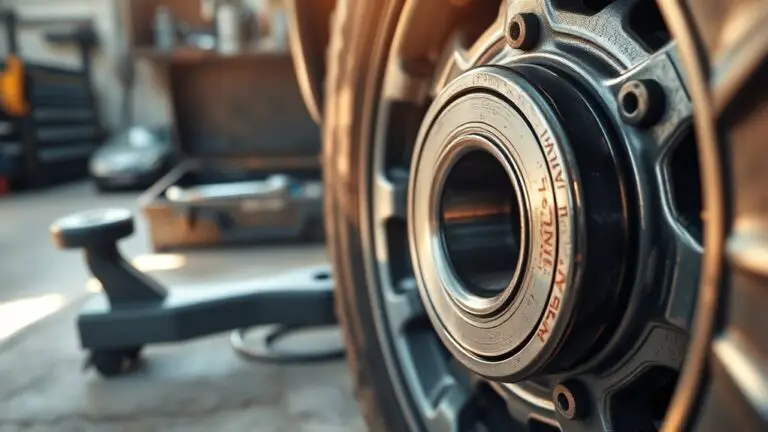How Temperature and Usage Cause ABS Pump Noise and Prevention Tips
Temperature fluctuations and high usage greatly impact ABS pump noise. High temperatures can wear components down, while low temperatures may thicken hydraulic fluid, causing sluggishness. Frequent emergency braking or aggressive driving increases activation, amplifying noise levels. To reduce noise, verify regular maintenance, check fluid cleanliness, and inspect mounting hardware. Using high-quality brake components also helps. There’s more to know about diagnosing issues and enhancing your ABS pump’s performance, so keep exploring.
Understanding the ABS Pump and Its Function
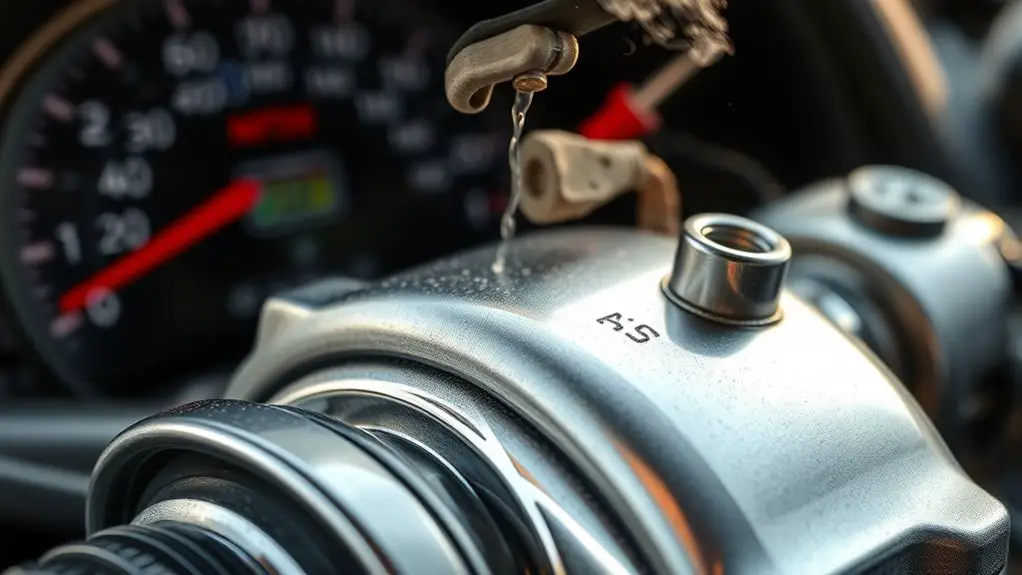
Although you might not think about it often, the Anti-lock Braking System (ABS) pump plays an important role in vehicle safety. The ABS pump components are essential for maintaining braking efficiency, especially during emergency scenarios. This system operates by regulating brake fluid pressure through a hydraulic system, allowing for ideal tire traction without locking up.
When you apply the brakes, the ABS pump modulates hydraulic pressure to each wheel, preventing skidding and enhancing control. It does this by rapidly pulsating the brake pressure, which you might feel as a vibration in the pedal.
Understanding the ABS pump’s function is significant for appreciating how your vehicle maintains stability and steering control during abrupt stops. As you navigate various terrains, the reliability of this hydraulic system empowers your driving experience, ensuring that freedom on the road comes with enhanced safety measures built into your vehicle’s design.
Common Causes of ABS Pump Noise
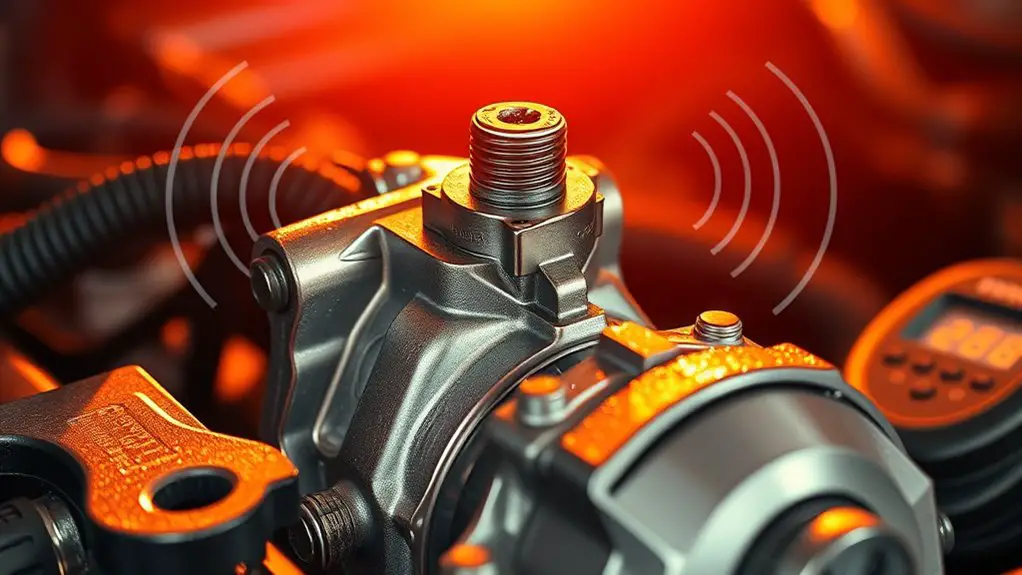
Temperature fluctuations can greatly impact the performance of your ABS pump, leading to increased noise levels. Additionally, frequent system activation during braking may exacerbate these sounds, indicating potential underlying issues. Understanding these common causes is essential for effective noise diagnosis and prevention.
Temperature Fluctuations Impact
When temperatures fluctuate, it can greatly affect the performance of your ABS pump, leading to unwanted noise. Temperature extremes can cause thermal expansion in the pump’s components, resulting in misalignment and inefficiency. This misalignment can increase friction, creating that annoying noise you’ve noticed. Here are some common causes linked to temperature fluctuations:
- Thermal expansion of materials affecting tolerances
- Cold weather causing fluid viscosity changes
- Heat build-up from prolonged use leading to component stress
- Rapid temperature changes causing contraction and expansion cycles
Being aware of these factors can help you take preventive measures, ensuring your ABS pump operates smoothly and quietly, maintaining your vehicle’s safety and performance.
Frequent System Activation
Frequent activation of the ABS system can lead to increased noise levels from the pump, especially if the system engages more often than necessary. This frequent cycling of the ABS puts extra strain on components, accelerating system wear and potentially leading to premature failure. Understanding the common causes of unnecessary activation can help mitigate these issues and prolong the lifespan of your ABS system.
| Common Causes | Impact on Noise Level |
|---|---|
| Aggressive driving | High |
| Poor road conditions | Moderate |
| Improper braking techniques | Low |
The Impact of Temperature on ABS Pump Performance
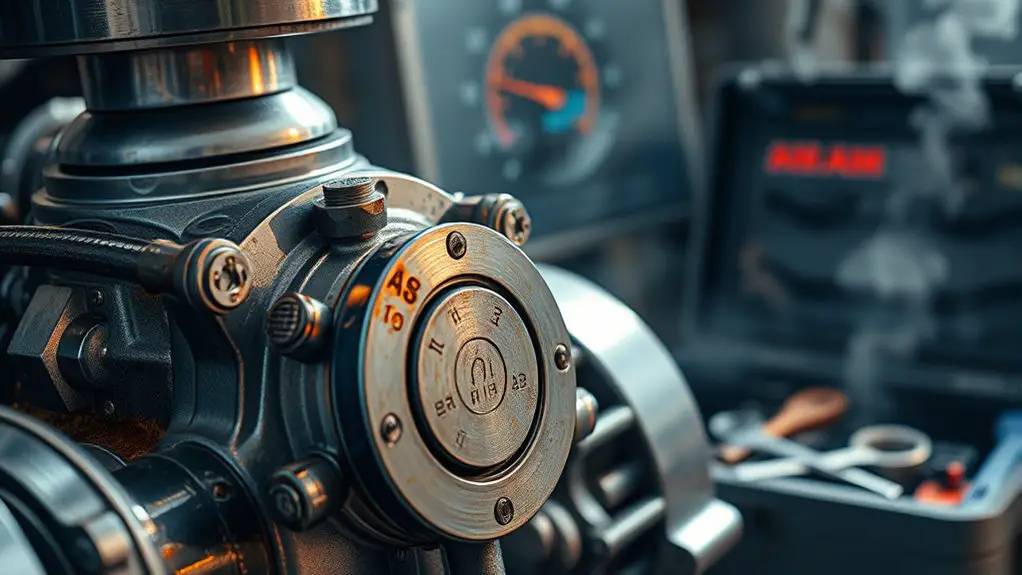
Although various factors influence ABS pump performance, temperature plays a crucial role in its efficiency and longevity. The ABS pump is particularly sensitive to temperature variations, which can lead to significant performance degradation over time.
Consider the following impacts of temperature on your ABS system:
- High Temperatures: Increased wear on components and potential fluid breakdown.
- Low Temperatures: Thickened hydraulic fluid can lead to sluggish pump operation.
- Temperature Fluctuations: Repeated thermal cycling can stress materials, causing premature failure.
- Ambient Conditions: Extreme weather can exacerbate existing issues in pump performance.
Understanding these factors can help you maintain your ABS pump effectively. By being mindful of temperature sensitivity, you can take proactive steps to mitigate risks and prolong the lifespan of your ABS system.
How Usage Patterns Affect ABS Pump Noise
As you operate your vehicle, the patterns of ABS usage can greatly influence the noise generated by the pump. High usage frequency, especially during emergency braking or frequent stops, can lead to increased wear on the pump, resulting in louder operation. Under harsh driving conditions—such as wet or icy roads—the ABS engages more often, and this heightened activity will amplify the noise.
Conversely, if your driving habits involve smooth acceleration and braking with minimal ABS activation, you’ll likely notice a quieter pump. It’s crucial to recognize that the type of driving you engage in can greatly impact not only the pump’s noise but also its longevity. Regular monitoring of your ABS performance can help you identify any unusual sounds associated with your driving patterns, allowing you to address potential issues before they escalate. By understanding how usage frequency and driving conditions affect ABS pump noise, you can maintain a quieter, more efficient braking system.
Diagnosing ABS Pump Noise Issues
How can you effectively diagnose ABS pump noise issues? Start by isolating the source of the noise through careful observation and examination. When diagnosing noises, consider these key factors:
- Frequency and Duration: Note how often the noise occurs and how long it lasts.
- Type of Noise: Identify whether it’s a grinding, buzzing, or hissing sound.
- Driving Conditions: Assess if the noise is more pronounced during specific maneuvers or temperatures.
- Vehicle Diagnostics: Utilize onboard diagnostics to check for error codes related to ABS functionality.
Prevention Tips for a Quieter ABS Pump
To maintain a quieter ABS pump, regular maintenance is essential. You should prioritize preventive maintenance by checking the fluid levels and guaranteeing they’re clean and free of contaminants. Dirty or degraded fluid can increase pump noise, so consider flushing the system periodically. Additionally, inspect the mounting hardware; loose or worn components can exacerbate noise issues. Tightening or replacing these parts can lead to significant noise reduction.
Another critical aspect is monitoring for any signs of wear or damage in the ABS pump itself. If you notice unusual noises, don’t ignore them—addressing issues early can prevent further complications. Finally, using high-quality brake components can also influence pump performance, leading to reduced noise levels. By incorporating these practices into your routine, you can guarantee your ABS pump operates smoothly and quietly, allowing you the freedom to enjoy a serene driving experience.
Frequently Asked Questions
Can ABS Pump Noise Indicate Other Underlying Vehicle Issues?
Yes, ABS pump noise can indicate other underlying vehicle issues. If you’re hearing unusual sounds, it might point to problems within the brake system, such as air in the lines or failing components. Using diagnostic tools can help you pinpoint the exact issue, allowing for timely repairs to guarantee safety. Ignoring these noises could lead to more significant problems down the road, so it’s best to investigate promptly.
How Long Does an ABS Pump Typically Last?
An ABS pump typically lasts between 10 to 15 years, depending on your vehicle’s usage and maintenance. Curiously, proper ABS pump maintenance can extend its lifespan considerably. Regular checks and fluid replacements help prevent premature wear and tear. If you notice unusual noises or performance issues, it might be time for an ABS pump replacement. Staying proactive not only enhances safety but also guarantees your driving experience remains smooth and uninterrupted.
Are There Aftermarket Solutions to Reduce ABS Pump Noise?
Yes, there are aftermarket solutions designed for noise reduction from ABS pumps. You can find specially engineered aftermarket parts that dampen vibrations and absorb sound, reducing the overall noise levels. These components are often crafted from advanced materials, enhancing both performance and quiet operation. When selecting these parts, make sure they’re compatible with your vehicle’s ABS system, as proper fitment is essential for achieving the desired noise reduction without compromising functionality.
Does Driving Style Influence ABS Pump Lifespan?
Yes, your driving habits can greatly influence the ABS pump’s lifespan. Aggressive braking or frequent hard stops can put extra strain on the ABS system, leading to premature wear. Regular brake maintenance is essential; neglecting it can exacerbate noise and reduce efficiency. By adopting smoother driving techniques, you not only enhance your safety but also extend the longevity of the ABS components, ensuring a more reliable driving experience while enjoying your freedom on the road.
Is It Safe to Drive With a Noisy ABS Pump?
It’s not safe to drive with a noisy ABS pump. While the noise itself might not directly impact driving safety, it can indicate underlying issues that could compromise your braking system’s effectiveness. If you ignore a noisy ABS, you risk further damage, potentially leading to brake failure. For your safety and peace of mind, address the noise promptly to guarantee your vehicle maintains peak performance and reliability on the road.

